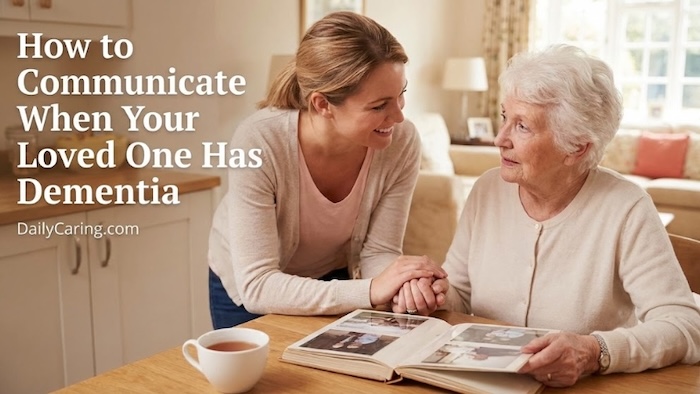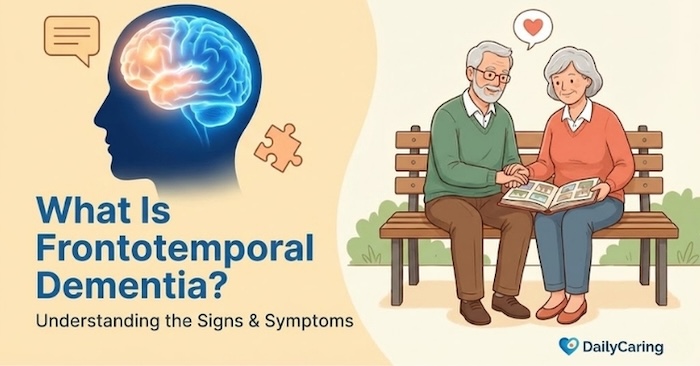When a loved one is living with dementia, communication can become a daily source of frustration and heartache for everyone involved. The “right” words often get lost, conversations can circle endlessly, and you might feel like you're no longer able to connect in a meaningful way.
But what if you could learn a new set of simple, powerful techniques that could help bridge that gap? This article reveals 15 practical and compassionate communication strategies designed to reduce stress, minimize conflicts, and help you rediscover the joy of connecting with your loved one.

Talking with someone who has Alzheimer’s or dementia can be challenging. Learning some simple yet effective dementia communication techniques makes it easier to connect with them and enjoy meaningful time together. Superior Senior Care shares 15 tips to help you communicate better with someone who has dementia.
Living with dementia can be difficult. It takes a toll on everyone involved, especially if outside caregiving services aren’t being used.
Conversations can often feel emotionally charged, such as sadness, anger, or fear.
Unfortunately, adding those emotions can make speaking with your loved one more complicated than necessary.
Instead, keep these 15 helpful tips in mind when you’re communicating with someone who has dementia.
15 Helpful Tips When Communicating with Somebody Who Has Dementia
1. Take a Moment to Prepare
It can be challenging to see someone living with dementia. We may experience a wide range of emotions, which can influence our behavior.
Take a minute to ground yourself before engaging in conversation.
No matter how advanced their dementia is, the person you care about is still in there – and they still care about you, too.
2. Stay Calm, Warm and Positive
Someone with dementia can pick up on emotions, especially if they don’t match the tone we’re trying to use.
Remember that this is someone you care about. You want to show that you care about them and the time you have together.
3. Remove Unnecessary Distractions
Like any person, someone with dementia may struggle with communication when there are distractions around.
Televisions, radios, and kids running around can easily catch our attention. What is vaguely distracting for us, though, can be torturous for people with dementia.
To minimize distractions, ensure all electronics are off or in quiet mode. Ask others to either leave the area or switch to a calming activity.
Observe the environment or check in with any in-home caregivers to identify any additional distractions that may need to be removed.
4. Clearly Identify Yourself
When someone has dementia, they may not immediately recognize you.
Make sure to introduce yourself and explain your relationship gently. This can help bring back memories and make them feel safe.
If they seem especially confused, having another person, like an in-home caregiver, introduce you can help them feel more comfortable.
5. Speak Slowly
Take time to slow down when you speak. It can help them absorb what you’re saying and make connections.
VIDEO: 15 Communication Tips for Dementia Caregivers
6. Use Short Sentences and Simple Words
Run-on sentences and large words can be confusing. Try to avoid that if you can.
Use one sentence at a time, pausing to let your loved one digest what you’ve said before continuing. The time you need to wait may vary day to day.
7. Be Direct With Your Loved One
To avoid confusion, say precisely what you mean.
If you’re referencing an object or another person, use the name or point rather than using pronouns.
When discussing a person, state their relationship to you and your loved one so they have the best chance of remembering them.
8. Don’t Make Assumptions or Jump to Conclusions
It can be tempting to finish someone’s sentences or even assume that they don’t want to participate in a social activity.
Avoid doing this whenever possible. Your older adult deserves to have a say in the activities they participate in, and to know you’re there for them.
Interrupting or excluding them sends the message that you do not believe they are capable of engaging in conversation or social interaction.
9. Practice Active Listening
Active listening is a form of communication that signals to the other party that you’re listening. Nodding and responding in validating ways help people feel heard.
That said, some active listening skills can be more distracting than helpful for certain individuals or in specific situations.
For example, using small encouragement words such as “uh-huh” might do more harm than good.
Take some time to experiment and evaluate what works best. If your older adult receives caregiving services, consider asking their caregiver for input as well.
It can be tempting to finish someone’s sentences or even assume that they don’t want to participate in a social activity.
Avoid doing this whenever possible. Your older adult deserves to have a say in the activities they participate in, and to know you’re there for them.
Interrupting or excluding them sends the message that you do not believe they are capable of engaging in conversation or social interaction.
10. Don’t Interrupt Your Loved One
It’s appropriate to set boundaries on what you will and won’t discuss. However, there are some roadblocks to conversation that you should avoid.
Avoid asking “Why…” or forcing your older adult to talk about something when they’re not in the mood to do so. That tends to shut down productive conversations.
Most importantly, resist the urge to interrupt. The flow of the conversation will be disrupted. Focus on listening to them rather than speaking.
11. Redirect the Conversation or Activity
Instead of trying to prevent someone from doing something potentially dangerous, redirect them toward a safer or more positive activity.
12. Make Suggestions Instead of Asking Open-Ended Questions
It’s much easier to communicate when you are given a choice between two different things.
Instead of asking someone what they want to eat for lunch, make suggestions. For example, you could ask, “Would you like chili or a sandwich for lunch?”
This allows your older adult to focus on choosing between two clear options instead of being overwhelmed by too many ideas.
Asking yes-or-no questions works similarly. Instead of asking what someone wants to drink, ask “Would you like some water?”
13. Use Engaging Body Language
Making eye contact can help your loved one know that you are listening. Try to match your body language to the emotion you want to express.
14. Consider Writing When Verbal Communication Becomes Challenging
It’s essential to identify the communication techniques that work best for you and your counterpart. Depending on how your older adult is feeling, verbal communication may not be their first choice.
Some people perform better when they can take their time writing a note (or even an email) rather than having a spoken conversation.
Writing gives them more time and can help them catch mistakes, such as choosing an incorrect word. That might help someone feel more comfortable interacting with others.
Remember to use the other senses too. Sight, sound, smell, taste, and touch can all be vital in communicating.
15. Be As Present As You Can Possibly Be
Most of what matters when visiting and spending time with someone with dementia is precisely that – the time together.
Getting assistance from caregiving services can also help make your time together more enjoyable, especially if managing essential daily tasks is becoming overwhelming.
Recommended for you:
- 6 Positive Ways to Approach Someone with Dementia
- “I Want to Go Home” in Alzheimer’s: Try 3 Kind Responses
- What Is It Like to Live with Dementia? 3 Insightful Personal Stories
Guest contributor: Susan Ashby joined the Superior Senior Care team in July of 2014 as Community Relations Manager. With over 27 years of experience in geriatric health, Susan brings extensive knowledge and insight to Superior Senior Care. She plays an integral role in connecting consumers and communities with resources for independent living.














All your information has been very helpful I’m taking care of my wife how has vascular dementia
Thanks for the kind feedback! We’re so glad our articles have been useful as you’re caring for your wife 💜
I’ve also found that it works better if I only address one idea at a time. For example, if I say we are going to the doctor’s appointment, and if you want we can pick up lunch while we’re out, and you might want to bring a sweater in case it’s chilly, that is too much information all at once. There are three ideas there, and each should be dealt with separately.
That’s a great point and an excellent example. Thanks for sharing!